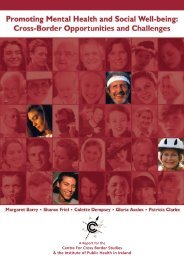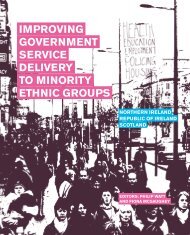PRIDE OF OUR PLACE - The Centre for Cross Border Studies
PRIDE OF OUR PLACE - The Centre for Cross Border Studies
PRIDE OF OUR PLACE - The Centre for Cross Border Studies
- No tags were found...
Create successful ePaper yourself
Turn your PDF publications into a flip-book with our unique Google optimized e-Paper software.
Research Methodology<strong>The</strong> research methodology used by the project researcher involved qualitative methods. <strong>The</strong>methods used are listed below:• Teacher questionnaires at the end of Year One and Year Two• Teachers’ reflective diaries: Year Three• Pupil Questionnaires at the end of Year One and Year Two• Focus groups at the end of Year Two in a sample of schools with some parents,grandparents and pupils• Reports and newsletters at the end of each year• Regular reports and updates from advisory personnel• Attendance at Steering Committee meetings• Attendance at residential training workshops <strong>for</strong> the three years of the project• Self-reflection questionnaire issued to teachers midway through the project• Evaluation of key statements of teachers’ project expectations at the conclusion ofthe project• Samples of work undertaken by schools• Attendance at a selection of exchange visit days each year• Visual and photographic material• Attendance at final year showcase event.<strong>The</strong> data <strong>for</strong> this research comes from the sources listed above but in particular the teacherquestionnaires, the self-reflection questionnaires, the reflective diaries and the pupilquestionnaires. <strong>The</strong> co-operation at every level of the research by the schools involved wasexcellent, and the rich data gathered from this work is as a result of the commitment andinterest of all involved. <strong>The</strong> teacher questionnaires focussed on the practical elements of theproject as well as professional development aspects such as use of key methodologies, training,education <strong>for</strong> mutual understanding and pupil skills development. 1 At the end of Year One,teachers noted that the following areas should be addressed in future training workshops:• Reflection on project to date• Revision of good practice• Opportunity to share experiences and to exchange ideas and practical in<strong>for</strong>mation• Discussion with partner school on content <strong>for</strong> the coming year• Discussion of ways in which schools could develop further links apart from the project• Input from advisors to generate ideas, topics and resources• Opportunities <strong>for</strong> schools to plan.All of these elements were addressed in future years’ training workshops. Participants weregiven more time to review, more time to plan, a focussed input on different approaches tothemes, and space <strong>for</strong> individual and group reflection. <strong>The</strong> Steering Committee constructed aflexible training structure which responded to the teachers’ needs, as well as having dedicatedinput into the professional teaching and learning aspects of the project.Key data was also gathered from the self-reflection questionnaires issued at the end of YearTwo. <strong>The</strong> Year Three training workshop focussed on self-reflection techniques and whatevidence to look <strong>for</strong> in terms of key statements. 2 At the end of Year Three, teachers were askedto use a diary <strong>for</strong>mat, with some headings as prompts, to write down their thoughts about thatyear. As the project came to a conclusion in 2006, teachers completed a fulfillment ofexpectations statement. Reports from members of the Steering Committee on exchange visitdays were also beneficial, as were the reports compiled at the end of each year (the schoolssubmitted a sample of work undertaken during the year which also <strong>for</strong>med part of theannual report).12 Pride of our Place 2002-2006
















